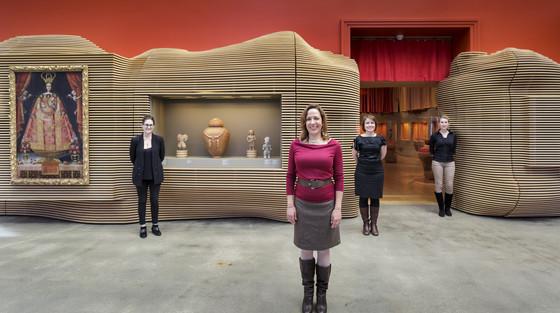LACMA’s Art of the Ancient Americas department is thriving more than ever due to major charitable support provided by The Andrew W. Mellon Foundation. In 2012, LACMA launched the program with the help of a $1.4 million grant from the foundation, which recently renewed its commitment for another four years with a $1 million grant. Under the dynamic leadership of Dr. Diana Magaloni (former director of the Museo Nacional de Antropología in Mexico City), the program, which includes research, conservation, exhibitions, programming, and conversations with countries of origin, has already made significant strides in advancing scholarship in the field.
One may ask: “What exactly does the Art of the Ancient Americas team do?”
The answer: A lot of important, scholarly work that is changing the course of art history.

Dr. Magaloni once shared that often, when people look at ancient American objects, the most they can say about them is that they are “pretty,” with no knowledge of their origins or how they were made. Through their multi-disciplinary approach to research, LACMA’s curators are unraveling the mysteries around these objects. They collaborate with myriad specialists in fields such as art history, archaeology, ethnography, and conservation science, to study artistic, cultural, and technical aspects of the objects in our collection. Approaching the artistic and stylistic qualities of the objects through technological perspectives allows the team to better understand the objects, as well as the artists and societies that created them, and assists in the vetting of authenticity. Provenance research is also an integral part of this process.

Through postdoctoral curatorial fellowships, the program trains emerging scholars in museum practices, focusing on objects as the locus of knowledge generation. The fellowships provide an invaluable opportunity to acquire professional experience in a museum environment, and more importantly, learn how to communicate about the history and art of the ancient Americas to museum audiences.
The program also works as a diplomatic branch of the museum, generating international agreements with key countries of origin reflected in the department’s collections, such as Mexico, Colombia, and Guatemala. The program’s research and exhibitions are enhanced by these agreements, which bring transparency to the department’s procedures and are the founding tools to creating truly diverse, respectful, and ethical curatorial and research practices.
With an exciting vision ahead, the next four years will be especially important for the program and its impact. As we endeavor to fully grasp the conception, diversity, and artistic skill that ancient American cultures expressed through their art, with The Andrew W. Mellon Foundation’s renewed commitment, the Art of the Ancient Americas department has a tremendous opportunity to communicate the value of their contributions to a mass audience, ultimately impacting the history of art for future generations and broadening our understanding of our own multicultural and diverse contemporary world.
Check out exhibitions organized by the Art of the Ancient Americas department! Exhibitions currently on view include Picasso and Rivera: Conversations Across Time (on view in BCAM through May 7, 2017) and Revealing Creation: The Science and Art of Ancient Maya Ceramics (on view in the Art of the Americas Building through June 4, 2017). Coming up are Ancient Bodies: Archaeological Perspectives on Mesoamerican Figurines, opening on July 1, 2017, and an exhibition on Panamanian ceramics, opening on July 30, 2017.




